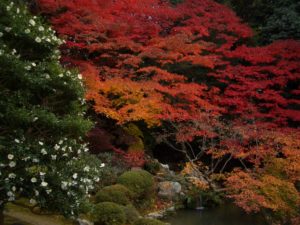 Autumn leaves shape the Japanese mind.
Autumn leaves shape the Japanese mind.
Autumn leaves are beautiful. But does anyone think so? I read some articles about negative aspects of autumn leaves in the United Kingdom. It sounds odd to me as Japanese. While many Japanese people enjoyed momiji-hunting (meaning to see momiji, Japanese maples), not all Britons did not seem to have enjoyed autumn leaves.
The Japanese loves to see autumn leaves; they often go out to see them and take their pictures.
The Japan Times, an English newspaper, puts it this way: “half of Japan’s population turn into photographers.”
Since the Heian era the Japanese have used the word, which shows how important for them autumn leaves are. Not only does momiji make Buddhist temples and shrines in tourist spots such as Kyoto more popular and beautiful but also it changes views of local parks and houses. A report about autumn leaves in 2010 from The Weather News says that half of the Japanese people thought that this year’s autumn leaves in the country were more beautiful than last year. The reason why this year’s momiji was more beautiful than last year is largely because of
longer hours of sunlight in summer. Above all, the Japanese always enjoy autumn leaves.
But Britain seems different from Japan. Although they were beautiful, not everyone enjoyed autumn leaves. I don’t mean that British people don’t like autumn leaves. What is interesting to me is that there are reportedly some Britons who see autumn leaves as a nuisance. It is a pain picking them up to clear roads or fields; they hit train punctuality, causing more delays than last year (Telegraph); there are even many people who see trees as a problem, which depresses a man who wants to make people love the plant (The Ecologist). Above all, the British did not enjoy autumn leaves as much as the Japanese did this autumn.
So it is interesting to know why the Japanese love autumn leaves more than the British does. Is it because that they are beautifully red, making people feel sacred? It might be so, as momiji hunting literally means, if the activity was related to rituals. But it is not. Actually, in this context the word means that people use their hands to enjoy picking up autumn leaves. Besides, red can’t explain the difference between Japan and Britain very much; the national flower of
England is rose. Red is meaningful to both of them.
It leads me to think that the Japanese loves autumn leaves because they make them feel Japanese spirit: the subtle and profound; elegant simplicity; transiency. That may be why so many Japanese people enjoy visiting Buddhist temples every autumn. Autumn leaves seem to shape the Japanese mind.
Meanwhile, the British is introducing “i-Tree software.” This gadget puts financial values on trees with the aim of making more people value the plant. The Japanese will be likely to follow if they find it useful. Above all, they like to use cutting-edge technologies as much as momiji hunting. Good stuff.

Ryo Kubota is a staff writer at Transpheric Management in Tokyo as well as a freelance writer. He has covered Sports for the Nippon Newspaper Company in Tokyo and teaches at a private tutoring school in Iruma, Japan. Having studied in both Tokyo and England in the areas of sociology, he has a keen interest in the world at large.








